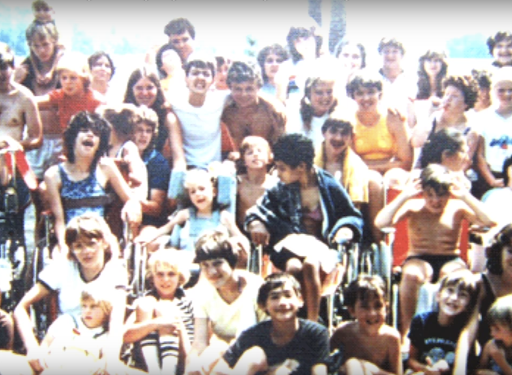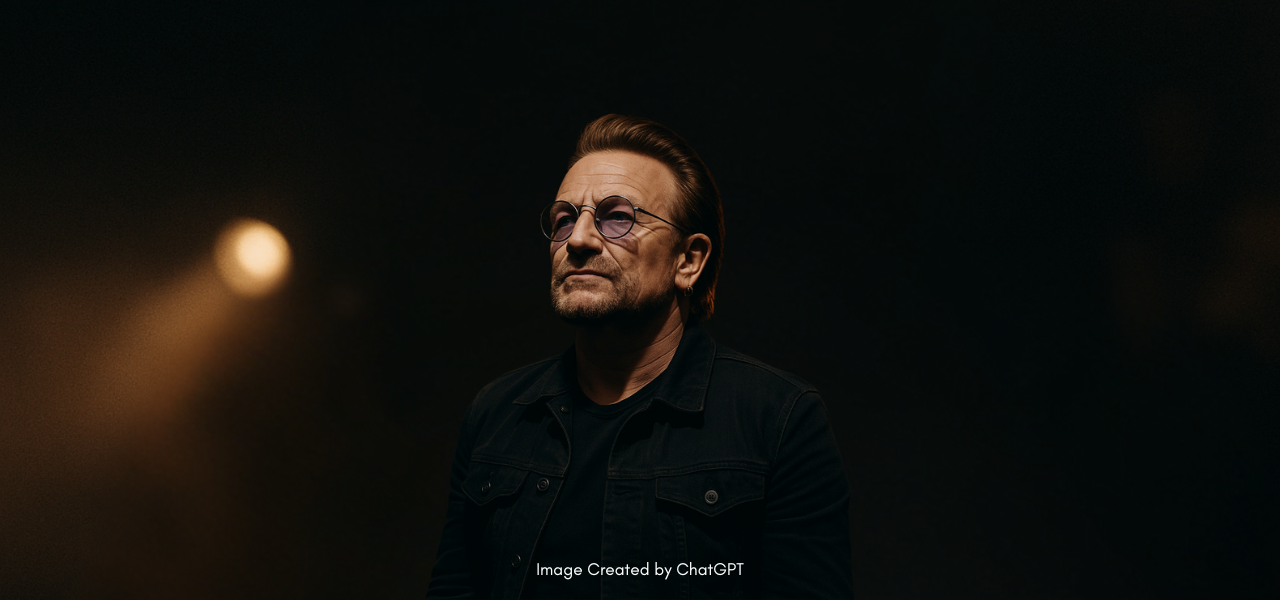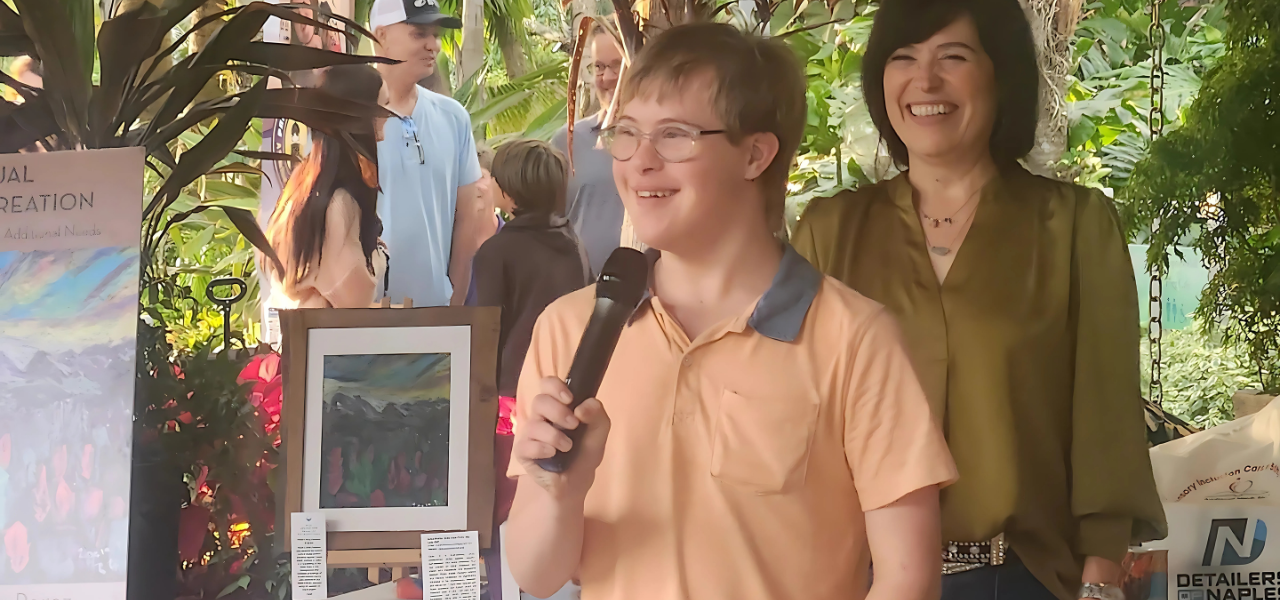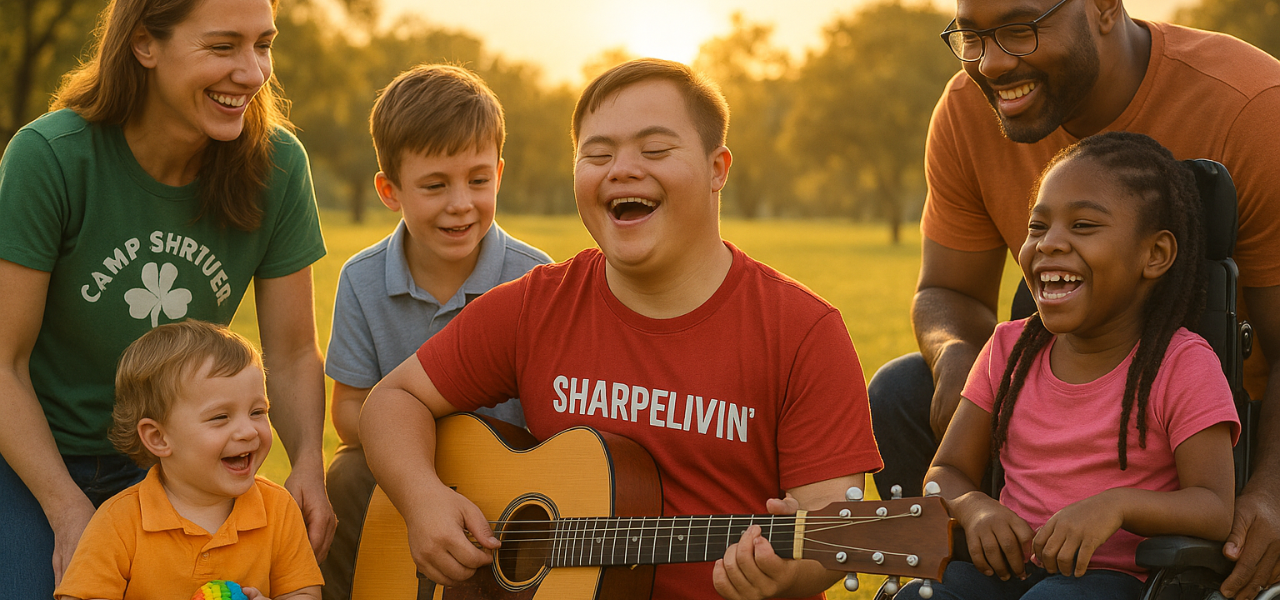He’s the child found dead-center in this photo, almost crouched down.
A girl in a sky blue wheel chair sits to his left. Another girl with a navy blue towel around her shoulders sits to his right.
He’s the shirtless one with orange hair.
He was nine the first time I met him. He was eleven the last summer I spent with him.
He was only a few years older when his body gave out and he died.
I haven’t seen him in over 35 years.
Yet the orange-haired pirate of a child — with his mid-arm crutches and his leg braces and his wicked smile and his stutter and his limited ability to speak in full sentences and his infectious laugh and his willingness to play fearless kickball at the speed of a fast moving but rudderless speed boat — continues to live every day in my heart and in my imagination.
This is a story about that orange-haired pirate of a child.
But it is also a story about another ‘near-child’ — one who was nervous and unprepared — that was invited to guide him one summer long ago.
And ultimately it is a story about the adult (who that ‘near-child’ became) that eventually allowed that orange-haired pirate of a boy guided him.
***
Chapter 1: A Pirate and The Uninitiated
It was 1984.
It was the summer before high school. I was barely a teenager. I felt incredibly awkward, shy, and lost. I knew so very little.
I sat alone in the way-back seat of well worn school bus. Tried to ignore everyone in the rows ahead of me. Tried to ignore what lay miles ahead of me. Tried to ignore that I was scared. Felt way over my head. Wanted desperately to get off that bus. Wanted to go home.
Much like so many kids heading off to camp for the first time.
But I wasn’t a camper. And this wasn’t my first summer camp.
The trees passed by my bus window in a blur. Yet, the trip took forever.
I just wanted off.
The only way off that bus that morning was to step fully into an experience that would fundamentally change my life. An experience for which I was woefully unprepared.
If you had stepped off the bus with me at the age of 14 in that long ago summer morning, you would have walked into a modest (at the time) summer camp nestled on the end of a lake in Dedham, in ‘central’ Maine, about a half an hour north of Bangor as if you were on the way to Ellsworth, which is on the way to Bar Harbor. which is where most people head when they go to Maine in this summer.
But an hour or so before you’d make it to Bar Harbor there lies a place of deep joy and refuge, healing and living. There lies a place called Camp Capella.
At the time Capella was sponsored by United Cerebral Palsy, but it welcomed all kids regardless of the uniqueness of their specific disability or their life circumstance. It was (and is) a camp where young people — whose bodies are broken or unique or challenged — are allowed to be children in the most beautiful and life-affirming of ways.
Capella did (and does) a lot of wonderful things, but it honored (and honors) childhood and life particularly well. In other words, it honored (and honors) the magical power of summer camp.
But I didn’t understand that at the time.
I was 14.
I was young, sheltered, naive, nervous. I had never spent an authentic moment with anyone with a visible disability in my life until the moment I got off that bus in the summer of 1984.
All I knew is that I was going to be a 14yo camp counselor working with handicapped children.
And I wasn’t sure I could actually get off that bus.
As a 14yo I was technically in no position to be a true camp counselor. Not even sure how it was legal, other than there must have been a stipulation for ‘counselor in training’ that someone selected for me as a way to invite me to work that summer.
You see, Capella was a place — at that time — that creatively took advantage of all resources and people and hearts and rolls of duct tape and whatever one could offer. It was truly a by-any-means-necessary culture when it came to the children they loved, protected and served.
That included an awkward 14yo boy who was going to be a first-time camp counselor with kids he had no idea how to love, protect and serve.
***
Chapter 2: Getting Off The Bus
Fast forward past my getting off the bus that first day.
Fast forward past a few days of intense counselor orientation — finding out I had to help kids eat, help kids get dressed, help kids use the restrooms, help kids speak (even if on a backboard and only able to blink a few expressions), help kids manage unexpected seizures, help kids stay alive.
And fast forward past the nervousness (and emerging sense of excitement) of trying to sleep the night before the kids showed up.
I’m standing at the front entrance of the main building. Another bus arrives. The door opens.
And out steps a pirate.
Okay, Uriah wasn’t a pirate, but I want you to imagine a young pirate kind of kid, a young pirate kind of kid with a shock of fire-orange hair and a smile that stretched to the horizon.
He bounded and near-collapsed out of the bus, one hyper violent step and landing at a time.
He was my kid for the summer.
And I was already in absolute awe of him.
***
Chapter 3: Looking Out To The Water
Uriah had one daily goal. Heck, maybe it was his one life goal.
It didn’t matter what sort of day it was or what was on the activity list. We could be struggling to get lunch into his mouth as his body faced excitable convulsions. It could be when his knees were bloodied from yet another collapse-fall as he sprinted on crutches down the concrete walk way. It could be in the middle of arts-n-crafts with fabric and glue and who knows what else mockingly stuck to his hands. It could be in the rain when clouds and plastic jackets were impossible to avoid. And it was absolutely anytime rest hour was forced on him.
The water of Phillips Lake always stood off in the distance, about 40 yards from the bathhouse where we kept our gear and changed clothing.
That lake was a siren call for Uriah.
All kids love being in the water at camp. That’s no secret.
But for a kid like Uriah, it wasn’t just love. It was life.
Literally that lake was the difference between Uriah feeling broken vs. feeling alive, between Uriah being dependent vs. being fully realized, between Uriah being a deficit vs. being a super hero.
You see, when Uriah was in the lake, the world got out of his way. Gravity got out of his way. Injury got out of his way. Seizures got out of his way. Limitations of any kind got out of his way.
On land, Uriah was a kid who collapsed, constantly covered in blood and never-healing scabs. Uriah was a young boy whose braces and crutches poorly prevented him from falling in every movement. Uriah was somebody with regular seizures. Uriah was a young boy who had at most 20 or 30 words that he could force out in a way one could easily understand.
But in the lake, Uriah was a porpoise.
Sleek and effortless. Full of splash and wonder. Contortions of grace. Inexhaustible. Fluent. Seizure-less. Boundless. Boundary-less.
At 14 — as an unprepared first-time counselor working with kids like Uriah for the first time in my life — I didn’t fully appreciate the profound wisdom that I was witnessing in Uriah’s natural response to the siren’s call of that lake.
And for much of the decades of teaching, coaching, working at more camps, designing schools, and learning to be a parent that followed that long-ago summer, I didn’t fully grasp the wisdom that that orange-haired pirate of a child was teaching me.
But I do now.
You see, that summer I thought that my job and responsibility was to pick Uriah back up and proverbially dust him off when he fell. I thought my job was to guide him and teach him and clean him and protect him and keep the world of risk away from him. I thought that my job was to get him into his bathing suit and down to the lake, let him swim for 30 minutes or so, then get him back to the bathhouse to dry off and change again so he could get back to the next thing on the activity list. I thought my job and responsibility was to send him to kickball and then to arts and crafts and then to lunch so he wouldn’t be late to what was next.
But where I failed is that I didn’t see what Uriah was seeing.
I didn’t look out to the lake that was calling him. I didn’t see the light and mischief in his eyes when he saw it. I didn’t see — in spite of blood and scabs and braces and collapse — that Uriah was in head over heels in love. And I didn’t see that all he wanted as a 9 and then 10 and then 11yo boy pirate in the three summers I was with him was to feel absolutely alive.
If I could go back to those long-ago summers knowing what I know now — thanks to holding Uriah’s story inside my heart and imagination for decades since he passed — I would have broken all the rules, been late to all the activities, rolled my eyes at the ‘end’ of swim time, and found by-any-means-necessary ways to let him be a porpoise in that lake without limit of time or space or gravity or words or pain.
Yes, arts and crafts mattered. Eating a proper healthy lunch mattered. Kickball mattered. Being ‘on time’ mattered. And learning to communicate clearly, even with a stutter and limited vocabulary, mattered.
But what mattered most was the wisdom of an orange haired pirate falling in love with the lake and the ease at which his body and imagination flowed thru the water, occasionally breaking the surface back into the sunlight in riotous laughter before diving back down into the welcoming mystery below.
What I’ve learned over time is that summer camps like Camp Capella do not exist for perfection. They do not exist for showing up on time. Or making sure falls never happen.
Camps like Capella are places where young bodies with a myriad of challenges are allowed to be children in the purest of ways and the boundlessness of limitless love.
By any means necessary.
And children like Uriah — with their wellspring of energy and wisdom and mischievous looks to the lake and the horizon — are our guides.
If we choose to see what they see, feel what they feel, love what they love, dive into what they dive into.
I am a better educator because of Uriah. I am a better parent because of Uriah.
Best of all: I am simply a better human being because of Uriah.
***
Chapter 4: Lesson Learned and Shared Many Years Later
A few years back, I was invited to be the opening keynote speaker at a large (and rapidly growing) school district in Ohio at the beginning of a new school year. It was a celebration and welcoming back of all faculty, staff, administration, and board members. The indoor complex was packed wall to wall. The energy was palpable. And this group of school professionals were ready to get at it, although still holding onto the last vestiges of their summer vacation, attired in shorts and flip flops and well earned tans.
The district was a model of excellence, resources and innovation. Their students have a well-deserved reputation for thriving in all forms of academics, athletics, and extra-curriculars. Their teachers are talented and proud of the impact they have on their students. The parents and local business leaders are rightfully proud of the accomplishments of the young people (and staff), touting it as central to the tremendous success of local business, real estate, and community culture.
When asked to speak about the ‘future of learning’ — central to the work I do daily — I was struck by the fact that the real opportunity for such a district wasn’t in further accelerating into educational trends and technologies. It wasn’t in increasing test scores. It wasn’t about more state championships. It wasn’t about better marching band routines. They had all of that in spades.
The real opportunity was to remind them of the beautiful complexities found within each of their kids. And in each one of them.
With no PowerPoint slides, no provocative education or economic stats, no compelling stories about the future of learning or societal trend lines, I instead told them the story of two boys: Uriah at 9 and me at 14.
I told them the story because it was a story of summer time.
I told them the story because it was a story of childhood laughter and overcoming camp challenges.
I told them the story because it was a story of new relationships and sunset conversations.
I told them the story because it was a story about all of us coming back together from our own summer adventures and conversations and challenges and laughter and relationships and sunsets, becoming a community of co-learners once again, something central to this moment for everyone gathered at this back-to-school kick-off event.
But I also told them about Uriah and me and that long ago summer of 1984 because it gave me a chance to admit publicly that I had gotten it wrong.
That I had failed.
That despite being a very experienced educator, coach, and school designer — and a parent of two — I had spent most of my career and early days of parenthood getting it wrong.
That while I was so often passionately focused on ensuring the growth and skill development and accolades and accomplishments of my students (and my own children) — and teaching them the ‘lessons they would one day need’ when the world got tough— I had failed to do what mattered most.
I had failed — in that long-ago summer of 1984 — to notice what Uriah noticed.
I had failed to focus on following his path of curiosity.
I had failed to be curious about what he imagined.
I had failed to honor what he craved.
I had failed to create space for what he daydreamed.
I had failed to ensure he found the lake so he could find himself.
So, standing on that massive stage looking out at more than a thousand educators and school professionals, I told them that my greatest failure as an educator (and as a parent) was not in failing to prepare my students (and kids) for challenges or their future,…
…but that I had failed to fall in love with their most precious present.
And that I had failed to see what they saw.
And that I had failed to love what they loved.
And that I had failed to let my Uriah guide me in becoming a better parent, educator, leader, learner, and human being for far too many years.
As I ended my talk, I paused to ask the audience of successful educators, staff and leaders to make space for the ‘lakes’ that their kids looked out at, so that their young people could become porpoises on their own terms no matter what real world challenges and scars lay all around them.
I asked them to make sure they found their own Uriah.
I asked them to see the world the way their own Uriah looked at it.
I asked them to follow their own Uriah’s invitation.
And I asked them to let their own Uriah help them become better parents, educators, guides, learners, and human beings in the process.
Written by Christian Long
 Christian Long is a designer, educator, and the founding partner of The WONDER Project, a design studio that helps organizations, schools and learning communities design and develop at the intersection of their mission and moonshots. Christian works nationally and internationally with students, teachers and school leaders, architects, and a wide array of multi-disciplinary professionals to design agile schools and organizations readying for the future. He regularly presents keynote addresses at conferences around the world focusing on the relationship between human-centered design and the future of education. Overall he is an unapologetic advocate for wonder and curiosity as the root of all learning worth doing. A much older version of Christian – many years into the future – can be found in semi-retirement at a tree-covered summer camp where he’ll continue to marvel first-hand at the shared joy of children and adults alike.
Christian Long is a designer, educator, and the founding partner of The WONDER Project, a design studio that helps organizations, schools and learning communities design and develop at the intersection of their mission and moonshots. Christian works nationally and internationally with students, teachers and school leaders, architects, and a wide array of multi-disciplinary professionals to design agile schools and organizations readying for the future. He regularly presents keynote addresses at conferences around the world focusing on the relationship between human-centered design and the future of education. Overall he is an unapologetic advocate for wonder and curiosity as the root of all learning worth doing. A much older version of Christian – many years into the future – can be found in semi-retirement at a tree-covered summer camp where he’ll continue to marvel first-hand at the shared joy of children and adults alike.
To find other articles written by Christian visit Medium
To learn more about Christian visit his Linkedin & Instagram accounts.
To learn about Camp Capella: “The mission of Camp CaPella is to enhance life experiences for individuals with disabilities by providing accessible recreational and educational opportunities.”




